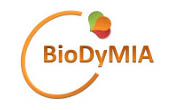2020 (09): "Use of complex coacervation for microencapsulation and controlled release of hydrophobic and hydrophilic active molecules: understanding the nature and role of interactions between biopolymers" (Jian WANG)
• Thesis supervisor: Adem Gharsallaoui
• Funding: Chinese government grant
In this thesis, the student will study protein / polysaccharide interactions in order to develop controlled release systems for antimicrobial molecules such as chicken egg white lysozyme or herbal compounds (essential oils known for their antimicrobial activity ). Complexation between proteins and polysaccharides will be considered as a solution to protect the antimicrobial molecules and control their release. Lysozyme is a model of proteins or peptides with antimicrobial activity with a positive net charge at usual pH. The essential oil components that will be selected will in turn serve as models for the hydrophobic volatile antimicrobial molecules capable of forming emulsified systems. In both cases, the biopolymers used for encapsulation will be selected according to their physicochemical properties but also according to their sensitivity to certain enzymes produced by the target bacteria. The objective is to obtain innovative "intelligent" systems in which the release of antimicrobial molecules is stimulated by the presence of the target bacteria.



 en
en